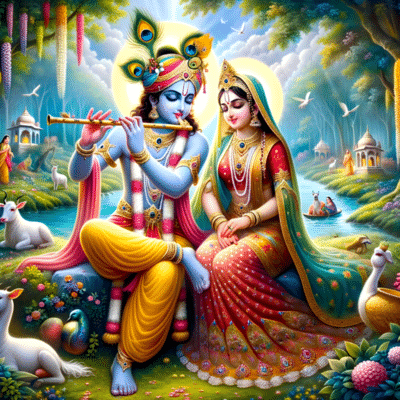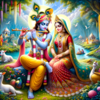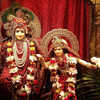
In the sacred groves of Vrindavan, where the Yamuna whispers timeless tales, the love between Radha and Krishna unfolds as a divine narrative, a love not bound by the constraints of time, form, or worldly expectations. Radha's devotion to Krishna, despite knowing she would never be his in the conventional sense, offers profound insights into the nature of pure love, spiritual yearning, and the soul's eternal quest for union with the Divine.
The Divine Union: Radha and Krishna

Radha symbolizes soul’s eternal longing for the Supreme Divine.
Radha and Krishna's relationship transcends the physical realm, embodying the union of the individual soul (jiva) with the Supreme Soul (Paramatma). In the Brahma Vaivarta Purana, Radha is depicted as the Shakti (energy) of Krishna, inseparable and eternal. This portrayal emphasizes that their bond is not merely romantic but a spiritual symbiosis, where Radha represents the soul's longing for the Divine.
Love Beyond Form: The Parakiya Rasa

True love transcends societal norms, connecting soul with God.
Their love is celebrated in the Parakiya rasa, a form of devotion that emphasizes the soul's intimate relationship with God, unencumbered by societal norms. The Gita Govinda, a seminal work by Jayadeva, illustrates this through poetic expressions of longing and separation, highlighting that true love is not confined to formal relationships but is a deep, personal connection with the Divine.
The Role of Separation in Devotion

Separation strengthens devotion, deepening spiritual connection and longing.
Radha's separation from Krishna, especially after his departure from Vrindavan, is not a tale of loss but one of deepened devotion. According to the Brahma Vaivarta Purana, Radha and Krishna were reunited after a separation of 100 years. This prolonged separation symbolizes the soul's journey through longing and yearning, which ultimately leads to a more profound union with the Divine. It teaches that devotion is not diminished by distance or time but is intensified through longing.
Radha's Love as a Spiritual Ideal

Selfless devotion without expectation leads the soul to liberation.
Radha's unwavering love for Krishna, despite the impossibility of their union in the earthly sense, serves as a model for spiritual aspirants. It teaches that love for the Divine should be selfless, without expectations or desires. This form of devotion, known as bhakti, is considered the highest path in Hinduism, as it leads the soul toward liberation (moksha) and eternal union with the Divine.
The Eternal MessageThe love of Radha and Krishna is not just a mythological tale but a living testament to the power of divine love. It reminds us that true love is not about possession but about surrender, longing, and the quest for spiritual unity. In a world often focused on material relationships, their story calls us to look inward and seek the Divine presence in our hearts.
The Paradox of LoveRadha's love for Krishna, knowing she would never be his in the conventional sense, is a profound lesson in spiritual devotion. It teaches that love for the Divine transcends all worldly boundaries and is the path to ultimate union and liberation. Through their story, we learn that the soul's yearning for the Divine is the purest form of love, leading us toward eternal bliss and enlightenment.
 In the sacred groves of Vrindavan, where the Yamuna whispers timeless tales, the love between Radha and Krishna unfolds as a divine narrative, a love not bound by the constraints of time, form, or worldly expectations. Radha's devotion to Krishna, despite knowing she would never be his in the conventional sense, offers profound insights into the nature of pure love, spiritual yearning, and the soul's eternal quest for union with the Divine.
In the sacred groves of Vrindavan, where the Yamuna whispers timeless tales, the love between Radha and Krishna unfolds as a divine narrative, a love not bound by the constraints of time, form, or worldly expectations. Radha's devotion to Krishna, despite knowing she would never be his in the conventional sense, offers profound insights into the nature of pure love, spiritual yearning, and the soul's eternal quest for union with the Divine.



